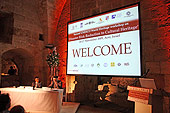|
|
 |
Disaster Risk Reduction
Second UNESCO World Heritage workshop on 'Disaster Risk Reduction to Cultural Heritage', 2009
Michael Turner and Michael Cohen
14-17 November 2009, Acre, Israel
|
|
The central and eastern parts of the Mediterranean area share common ancient traditions and cultures and therefore many similarities in cultural heritage sites and monuments. Moreover, this area suffers from comparable natural and manmade risks, such as seismic hazard, by sharing a common seismic history. In the last decade, strong earthquakes hit Turkey and Greece, acting within the same geological environment.
The management of the risk preparedness is a common challenge for countries throughout the world. Hazards are not limited to modern borders but are present along vast geographical areas, and therefore require a universal reflection about how to face the problems shared by the different countries including the administrative and technical solutions.
|
 |
|
Photography: Nir Yaniv, PHOTONIR
|
The current workshop will focus on topics related to the risks to cultural heritage and on the assessment, identification, analysis and management activities that aim to reduce the potential risks and on how to manage and mitigate them effectively.
Following other conferences and activities which have taken place around the world in the last few years on the need to protect endangered and threatened cultural heritage, our goal is to promote the discussion on these topics in order to improve the international as well as local preparedness for disaster risks. In addition, our aims are also to improve cooperation between countries and professionals and to create the establishment of an international as well as regional regulations and implementation of methodologies.
|
|
An early preparedness and the establishment of regulations and methodologies for such situations may significantly reduce the hazards to cultural heritage, through the creation of quick and efficient response mechanisms in the event of disaster as well as the prevention of anticipated disasters.
As part of an international initiative to create new methodologies and operational practices in disaster risk reduction and management of cultural heritage, an international workshop on “Risk Management at World Heritage Properties, took place at Olympia, Greece, on November 2008. This workshop was organized by UNESCO and the Hellenic Ministry of Culture. Major topics that were presented and discussed in the workshop in Olympia, Greece, included:
1. Disaster reduction in global context: main causes and effects of disasters, institutional frameworks and international policies, warning systems and methodologies for reducing disaster risks.
2. Disaster risks in the heritage context: impacts of disasters on cultural (and natural heritage) properties, existing policies and tools, problems and perspectives, methodologies for reducing disaster risks.
3. Risk Reduction in the World Heritage context: the strategy and a proposed programme.
The goal of the current workshop is to initiate a meeting between experts from around the world who are involved in the management and mitigation of risks to cultural heritage. The meeting will include:
1) Presentation of case studies of the experiences carried out by the countries of the Mediterranean and other countries in management of natural disasters and hazards to cultural heritage.
2) Discussions concerning the actions undertaken by the countries administration to strengthen the preparedness for future risks (e.g. Italy’s Risk Map) and present the limitation the effectiveness of the actions.
3) Prepare the basis for a long term action plan to be adopted by the World Heritage Committee, and other institutions.
|
 |
|
Photography: Nir Yaniv, PHOTONIR
|
Proposed outcomes:
1. Publication of the lectures, discussions and conclusions of the workshop.
2. A network of leading experts on the topic of risks to cultural heritage.
3. Operational guidelines for the implementation of these issues.
4. Report for disaster risk reduction and action plan to be presented to the World Heritage committee.
At this stage the workshop is to be sponsored by the UNESCO World Heritage Centre, the Italian Ministry of Culture, and locally by the Israel Antiquities Authority and the Israel Commission for UNESCO. Other organizations involved in the workshop preparation will include other research institutions and universities.
Photo Gallery
The brochure of the workshop
Programme
The Olympia Protocol for International Cooperation, 2008
|
|
|
|
|


